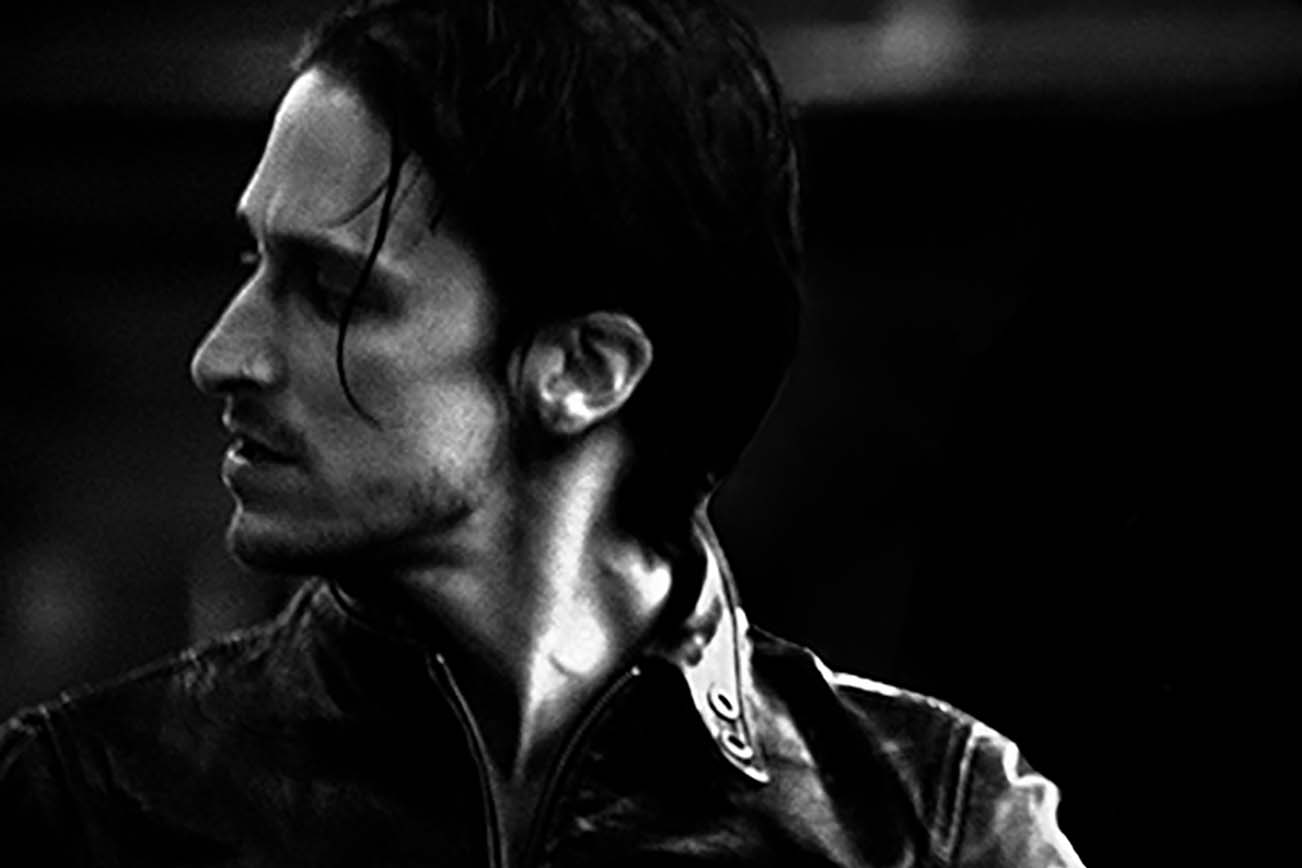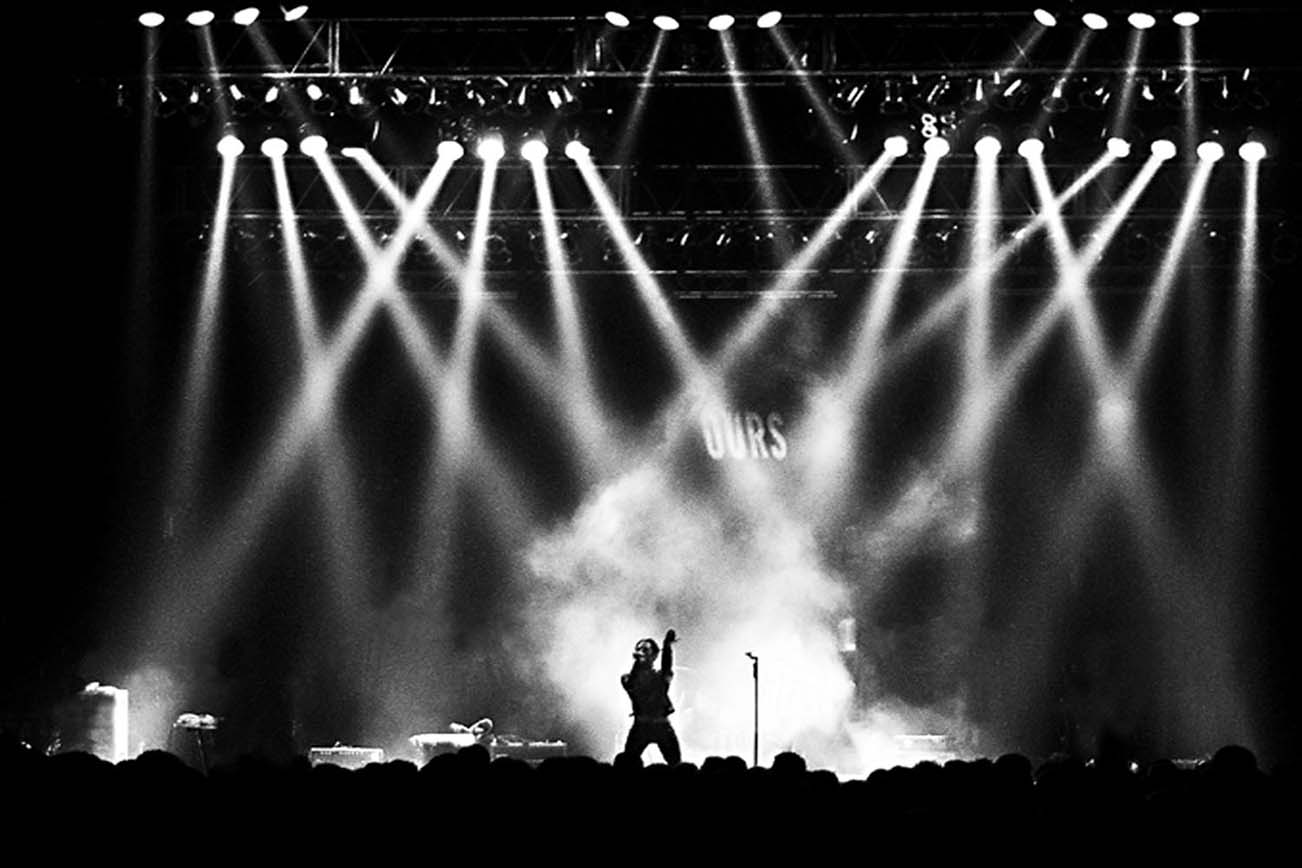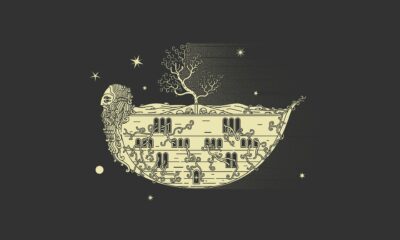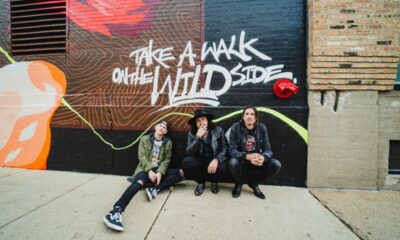Interviews
OURS Frontman JIMMY GNECCO on the Albums ‘New Age Heroine’ and ‘Spectacular Sight,’ and Preserving His Artistic Vision [w/ Audio]
OURS singer, songwriter and guitarist Jimmy Gnecco chats with us in detail about his career, his artistic visions and virtually everything else in this lengthy chat about his career.

Jimmy Gnecco is a visionary singer, songwriter, and multi-instrumentalist from New Jersey. He is the frontman for the rock band OURS, as well as a solo artist, and is known for his multi-octave vocal range and singing style, often described as both cinematic and emotional. Jimmy signed to Dreamworks in 1997 under the moniker of OURS, and his first record (Distorted Lullabies) was released in 2001 and produced by Steve Lillywhite and Gnecco. Distorted Lullabies achieved moderate success, with the single “Sometimes” charting on the US Billboard Modern Rock charts. The follow-up record Precious was released a year later produced by Ethan Johns.
Gnecco signed with Rick Rubin’s label American Records afterwards. Gnecco worked with Rubin to realize 2008’s release Mercy (Columbia/American), arguably the most beautiful record from the OURS catalogue at the time. In 2010, Gnecco released his highly anticipated self-produced first solo acoustic record, titled The Heart on indie label Bright Antenna, and followed it in 2011 with the release of The Heart: X Edition, in which Gnecco built upon the intimacy of his solo album with a lush, full band version of the record.
OURS followed up Mercy with the Devil EP and a re-inspired and resurgent self-produced release Ballet the Boxer I in 2013. The latter record built upon the moody, soulful and epic sound captured on Mercy, but with a greater sense of urgency that transcends the music’s emotional pitch. In the spring of 2014, Gnecco supported Lana Del Rey on tour before spending a few years in the studio; writing, recording and producing the second and third chapters of a three-record series. Chapter II, titled New Age Heroine, was just released on November 18th, 2018, and it brings Gnecco back to the core of what he and his band OURS have been all about; music that reaches deep into one’s heart, touches the soul, and lifts the spirit. In 2019, OURS will release Chapter III, titled Spectacular Sight.
Gnecco’s dynamic voice, songwriting style, and live performance have received worldwide acclaim from critics and fans, helping him build a cult-like following. He has a reputation as a visionary artist who will go to great lengths to achieve the sound and scope of every one of his songs. OURS has toured with bands like The Cult, A-Ha, The Wallflowers, Marilyn Manson, Blue October, Circa Survive, Lana Del Rey and Filter, among others.
Gnecco took a generous amount of time to talk about his wealth of new material with PureGrainAudio, touching on numerous facets of his creative process. He will touch down in Toronto on March 4th with Leeds (Royston Langdon) for an intimate performance at the Horseshoe Tavern. The audio from this interview is included here as a SoundCloud embed if you’d like to hear Jimmy’s candor as he answers.
Here’s Ours’ official music video for “Bring You Home.”
Where are you at right now. You’re still on the road, right?
Jimmy Gnecco: I’m actually home because tomorrow night is New York.
Nice. That’d be a show.
Gnecco: Yeah. New York City at City Winery.
Well, listen. Until recently, and getting that note from your PR, I didn’t realize that you had put out material in 2013 and I feel like a bit of a schmo for that because I consider myself to be a fan.
Gnecco: It’s okay. You know that record that we put out was a bit under the radar. It’s a bit undercooked as well. And it’s kind of part of our whole plan to tell you the truth. So it’s not too surprising that many people didn’t know about it, so it’s okay.
Maybe I’m not alone there. Can you perhaps talk a little bit about what you’ve been up to since Mercy came out in 2008?
Gnecco: Yeah. Well, we had done a lot of touring leading up to the release of that record. We toured for about two years leading up to it and then tried another strong year after it was released. For some reason, we were having a tough time with the crowds. We did some opening slots, and they (the crowds) weren’t feeling us for some reason. They were probably just the wrong kinds of tours. We toured with Manson. I like Manson. I’ve appreciated his music here and there. It was an odd pairing. We were putting this record out with Columbia Records, and I had already been through DreamWorks Records.
Dreamworks and Geffen. And it was a new deal with Columbia and a whole new staff, and it would have come across as kind of destructive and difficult, as I kind of had that rap as it was. Not for any drug reasons or anything that. Only for wanting to make great records and fighting for it to be great to the end. That was, to me, just trying to maintain integrity. You know sometimes it doesn’t go hand-in-hand. With the labels, I was kind of viewed as (I would think) a real artist. That’s what I think a real artist should do. So when we went to Columbia, you know, I felt a little pressure to not give a bad impression. And so I said yes to the Manson tour. That ended up being self-destructive to tell you the truth because it was two months solid of 5,000 people a night chanting “you suck” and throwing coins at me.
Right. Right.
Gnecco: So that was a little defeating at a time with a record that we were excited about. We were proud of the record. It ended up being a tough time, but we stuck it out. We toured for another year there. But then I took a break to try something different and instead of doing another record with a full band I decided I had a bunch of acoustic songs that I felt would kind of do well in that in that area. Not necessarily having big drums and loud electric guitar. So I made that record. I ended up calling it a solo record, just because. I don’t know… I could have called it an OURS record as well, I just decided not to. It was a change of pace just to see.
So I did that. That was a process of a couple of years as well because I started it and my mom got sick, and we lost her to cancer during the time of me making and putting that record out. You know, as everybody does, I’ve suffered a lot of loss at that time of Mercy. My first cousin who was raised as my brother, he passed away at 36 years old, and my girlfriend had taken her life right before that. I kept pushing through, you know? Trying to move forward, kind of hiding in the music and the music was a good thing for me, like therapy. But somehow at the end of the Mercy cycle ongoing into my solo record, it just kept getting worse in the sense that I lost my mom and kept pushing through that.
I buried her in the middle of doing shows and got on stage the next night in Hoboken, New Jersey and played a two-hour set without, you know, without thinking about it. Because that’s what I was doing, I was out in the machine and kept going. I guess after all that, I decided that I didn’t really want to be on a major label or any label at that moment of time, to tell the truth. I asked Rick Rubin to let me go from Columbia Records from American Columbia. I love Rick very much, and I had I didn’t have a single issue with him. I love that guy like an old friend. I just didn’t want to be a part of that machine for a bit. So I wanted to try to make a bunch of music and put it out on my own terms and timelines and everything like that. So I looked at this new age we are in; Where we are at with the Internet and all of that and just realized that we really don’t have to sign with a label right now.
There are a couple options, you know, with crowdsourcing and crowdfunding I was on the fence about that because I felt like I didn’t want to beg people for money. That’s not right. It’s a little self-congratulatory, I thought, to assume that people should be donating money for us to make a record. But we did do a campaign, and it was not about donations. It was basically just pre-orders for the most part. We thought that if we put up pre-orders and we offered a few things that people get for their money whether it’s merchandise or signed lyric sheets or private performances things like that, but there would be no begging or anything or asking for a dime from anybody.
So we did that. We hit our goal, and we made the record. And what happened that I had so many songs… I had a couple of hundred songs that I was looking at. I felt like I’d like to do something where it’s almost like a play that could exist long after we’re able to play music anymore. Something that I could put together in that kind of way with that kind of production. So we started to just record. That record that we put out, I think it was 2012 or 2013 maybe, that was the first one in a series of these records.
And the point of that record… It’s a little crude sounding… not super-hyped-up or super-produced in the sense of a lot of instrumentation when compared to some of the other records that I have made and what I often do. But I did that on purpose because it’s the first part of the story that’s supposed to kind of go back to an early time in life and have a youthful kind of energy. I don’t think many fans understood it because they’re used to Distorted Lullabies from me which was my first official release. Made at a young age, it’s a kind of mature produced sounding record.

Yeah, it was clean.
Gnecco: So to go back to being pretty crude and raw I’m not sure if people understood because unless they’re really committed to an artist. You know if Seal made a really crude record I’m not sure if I would love it as much as I liked Kiss From A Rose and all that stuff. I don’t know if I would. It’s hard to say. So. I knew that it was a risk, but I had to do it because I had a bunch of these songs of the spirit that existed before I had gone to where I was on Distorted Lullabies. I had the choice of letting them go and never revisiting that place artistically and emotionally which sometimes I feel like it was a better thing to do. It’s just that they were a part of the past when I was younger.
But I decided to explore them and go there. And so if I would have produced them in a way that was older like, say the way Sting have developed some of his songs from The Police and done them in his solo career. I felt like I didn’t want to do that. So I had to revisit this mindset that was where I was at during that time, so that’s what the first record was – this Ballet The Boxer record. I was happy in a sense when I could just do that; we made it we put it out because I could get beyond that. To get back to my growth and where I felt like I was I was going to and where I wanted to be creatively.
So, over the last five-plus years I just kind of disappeared into the recording studio and started to record as many of the songs as I could. And so this record that we just put out, New Age Heroine, that for me is kind of picking up from the emotional space that I was in doing Distorted Lullabies. And I think evolving even a bit from that. So as I see it, New Age Heroine is kind of a follow-up record to Distorted Lullabies for me. So sequentially it (my progression) would be different. Really if I had to do it, it would be Ballad The Boxer as a youth and then Distorted Lullabies. Then New Age Heroine.
Right on.
Gnecco: New Age Heroine, I decided to put it out pretty quickly as well because I’ve been working on (even again) with the evolution of that for where I’m at is this record Spectacular Sight. It’s built to be more in these kinds of stadium anthems with hopefully the human sense of what I do and has some of the more slow deep songs but bringing them up to a place of where they hopefully are really getting people going. Messing people up in a large space. So again it was a slight pickle because Spectacular Sight is where we’re at right now. These are the songs that we want to play, but New Age Heroine, we can’t ignore these songs.
There is something about them that I really believe in. So, again, I just kind of put out this quiet, under the radar release of that record in hopes that it would just get into people’s hearts and it was not about a big hype machine or anything on that record. I want people to discover it naturally, and I want people to share it with one another and have it be that kind of record; like you know, an album like Pink Moon was by Nick Drake. I didn’t know about that record until many many years later and discovered it just from word of mouth again, and it’s a special record to me for that reason. So I just wanted New Age Heroine to be like that for people.
Cool. Well listen, I’m a crowdfunder. I’ve Kickstarted. I’ve Pledged. And I’ve had experiences from incredible to utterly shitty using those interfaces. So I’m kind of curious as well just what artists are going to do to gain capital and allow their fans to buy into new music.
Gnecco: Yeah, it’s super tricky now because of Spotify. Spotify and all those services obviously being like the Netflix of music. And you can’t be upset with the consumer for wanting it. Because people love music and to have it all at their fingertips for that price it’s an amazing thing. But you know Spotify, and the labels are all partners and buddies now, and the labels again are stealing from us more than ever. More than ever now. They are just stealing from us pushing the streams, and then you pull your music on the streaming sites, and the fans are like getting upset with you about it and think that we are being cheap or whatever it is.
But there’s literally no way to make the product if there’s not some form of supporting it, so that’s what we’re left with. Luckily, we’ve gotten through it this time because I have this building and a bought a bunch of gear, and I think I learned how to use it. So luckily I’ve been able to record, and I work production jobs, and I produce things for other people, and that’s funded our music now. But without that and without the support of what is basically a fairy godmother over here who has also jumped on to really support us and help out… it’s really a fucked time.
Yeah. And my understanding is that Spotify hasn’t shown a profit yet. That’s kind of scary.
Gnecco: That’s what they’re saying right. That they (Spotify) haven’t shown a profit yet. You know what, I don’t know. Millions of people are using it. It’s ten dollars a month. They say the company is worth multi-billions of dollars and they haven’t seen a profit? I’m confused by that. And I’ve been saying now since it started because I know what I went through and how tough it can get with the labels. Scratching my head going where something’s not right. There is no way that they would give that. These labels now hold all the cards because Spotify and these other companies are going to want the content and they have the rights to all these artists. So the labels hold the cards.
There’s no way, knowing what I know about the labels who are obviously all businesses. There’s no way they would give that away. So I kept going “they have to be cut in.” They have to be getting something that nobody’s talking about. There have to be in on the back end of Spotify as a company. There’s no other way. And sure enough it’s coming out, but I have been saying it from the beginning. But yeah, how is it that they’re not showing a profit?
“Sometimes” you just need a great song and awesome video to go along with it. Right?
Yeah. I don’t get that either because you’re right, everybody’s using it. It’s nuts. So the touring you’re doing right now with Royston Langdon. Are you both performing solo acoustic or are you using supporting musicians?
Gnecco: Royston plays entirely alone. He plays guitar and piano and jumps back and forth. And I play a bunch of my set alone and then I have a piano player from OURS playing some songs with me as well. But it is a stripped down set. It’s not a full band or loud or anything. Well, I can get loud. (laughs)
Have you and have you and Royston ever co-wrote material together?
Gnecco: We haven’t. We just met on the first day of the tour. So no we have not written together. We sing together on the tour which is just awesome for me. I’m happy about it. But we haven’t written anything together. I love Royston’s voice. I love his talent. I’ve been a fan from the beginning with Spacehog, so this is a thrill for me, this whole tour.
I’d love to know what you feel the most upbeat song you’ve ever written is?
Gnecco: Well, I’m not sure… there is of course always a silver lining in just about everything that I write. Emotionally upbeat, right?
Yeah.
Gnecco:I don’t know. “Saint” off of Mercy, maybe?
Yeah maybe. I mean of all your catalogue Mercy remains my favorite album. I still play it all the time. I think it’s a great album.
Gnecco: Thank you. That was the first one I felt like I completed. There were things on Distorted Lullabies that I felt like was starting to find space I wanted to be in. But you know just the struggles with the label. They didn’t really allow me to finish it. I’d finished “I’m a Monster” and “Sometimes” “As I Wander” and the reprise to a song called “Drowning” on the record. But I wasn’t able to make that record how I wanted to. Even though you know my A&R guy would go and say “Are you fucking crazy? You wrote every note on the record. You continued to work on it.” But it was always working in some sort of structure and confines of them controlling it. So I just went and recorded songs on my own. And like I recorded “I’m a Monster” and “Sometimes” on my own. And then if I was able to do that with the whole record, I think it would have gotten to where I wanted it to be like Mercy did. And when I went with Rick Rubin, he said, “I think these are the best songs that you’ve written to date. I love you. I believe in you. Go make your record.” And he didn’t come to the studio for one day. Wow. We worked on the songs at his house. The song arrangements. I’d play them, and he would say, “maybe repeat that part” or “I don’t think we need all of these parts.” And so we would look at and say well what should we cut. That was a very collaborative process.
Even though he didn’t write anything or didn’t get into specifics to say “ok sing this part this way” or “write this bit this way” or “these should be the words.” There is nothing like that. He was always just challenging me to complete it so yeah. Mercy to me was the first time I felt like I could say; ok whether or not it was going to be amazing to other people who can ever tell. But because you know it’s different songs than Distorted Lullabies and some people might be attached to that because of the songs and their feelings in the spirit of the songs. But as far as the completion of the project I felt that it is the best I can do right now. And I listen back to and say ok I could change this and change that… you can always change it. But at least with Mercy, I felt that we’d covered the spectrum of emotion and art that I want to cover on this record. I was given complete freedom to do it from Rick. And the level at the time, Geffen. So I’m happy. We were proud of it, and you know this there’s something that I go (groans) great song, but could have been a better mix a better approach with the recording but all in all, you know, I think that happens with everybody. What’s most important is that when we finished it, it wasn’t this sense of oh well we are nowhere near finished. That’s what happened with Precious and Distorted Lullabies… DreamWorks just said, “no you’re done.” With Precious, I was like “but I just started.” And them saying, “No you’re done.” I said, “Oh this is going to be a weird record.” It’s not even half done, but ok.
Classic. You’ve described OURS as a collaborative solo project. Like it’s always your creative vision ultimately. Do you find that being able to do everything musically ever works against you?
Gnecco: I tried to the best I can to be objective about what I’m capable of and what I’m not capable of and when I need some somebody else’s playing abilities or their approach on the issue and to add to it. So I have a few moments here and there where I feel like I’ve hit the wall. I don’t know what the adjective would be; if it’s fearless or crazy or but I just don’t stop. I hit the wall. I don’t look at it as a defeat. I look at it as “ok great.” It brought me to this place of forcing me to go a different direction. And so I’m always learning. And so for me, that’s why the arrangement that we have with my friends and the people who have played OURS is so great. I’m running with an idea already, and I play it for them, and they either like it, or they don’t like it, and maybe they start to hear an approach or not.
Distorted Lullabies for the most part with the exception of a couple of things on the bass was me for the most part. There were a couple a couple of things that were added from Boz Borrrer on the guitar and Patrick Warren who plays keyboard on it. Whereas initially, I didn’t think of that. But for the most part, I wrote every single part and pattern on that record. Mercy I decided to take a different path. I had a couple of new guitar players in the band and one guitar player that played mostly that really spaced out stuff. And then a more meat and potatoes kind of guitar player would play to hold down the changes and that kind of thing. And I kind of do both of those as well, but I figured you know what? This time instead of me completing each song let me leave certain aspects open for this crew to bring to bring something to it. It was still like the song was finished kind of thing. But the way that we were coloring it and was not as structured. The house was built. It was like; look, are we going to put a whole bunch of things out here and decorate the landscape? What color we’re gonna paint inside? Are we going to do that kind of thing? And normally I would, for the most part, be on continuing to fill those ideas in myself again. People can look out and be like, you know, what a prick! Because he’s controlling.
That’s really not the case. It’s more about when you’re trying to get something going for people to genuinely understand why I do it this way and why it came about this way. When you’re alone, and you’re really trying to get a project going, and you can’t find anybody to commit to playing with you. That’s where I was before I signed my deal with Dreamworks. I was sitting alone writing these songs alone coming up with all the parts alone and just trying to create inspired people who wanted to devote time to being in a band, and I had written all the songs, and I got used to doing it that way. So when I found two people to play with me, we only played like three or four shows tops. Then the whole bidding war started to sign me.
So I had built it essentially on my own, and there have been plenty of times where even in between record cycles where again I’m alone, and I spend a lot of time alone working on the songs. So it’s not a thing where we get in a room with the band and write some songs, and then I run away with it. It really is me spending the time alone doing it, and when there’s not always budgets and all that stuff, it’s not easy to keep everybody around and going. So there I am again alone. So there’s that perception can be, “oh, the guy is controlling.” But it’s not that I set out to be that way. I do it because you don’t have a choice. It’s like if you’re running a business even if it’s a pizza shop and it’s your business. At the end of the day, you may have great employees, but it still comes down to if you can’t afford to pay everybody who’s going to hang around the pizza place and deliver for you and make pizza. You’ve got to do it. So I just think that’s often out of necessity.
And then, because I got accustomed to doing it that way I start to write the song on the guitar the piano and then all of a sudden I know I’ve got to figure out the drums because I can’t wait. Historically I can’t wait for a drummer to come in and start to play. Or tell me what they think it should be. And then I bring in a new drummer, and they tell me what they think it should be. I have to really lock down the idea so the parts are part of the writing composition so it’s not as simple as, “Ok I just had this strumming guitar part, what do you think the drums should do?” That’s where I would have this guitar part. The drums are going double time. So the guitar needs to match doing that. Once I write it that way I want to hear it that way because that’s just making it work. So you know it’s that’s kind of what happens with me and how the process goes.

Every once in a while. Like with Mercy, I would have read a lot about open, and I left it open for a long time to see what people would contribute. And there was definitely contributions. That record was better as a result of me not doing it entirely alone. But I could have completed it alone just the same. And it would have been to me it would have been still a great record, and there were plenty of times where I had to step in and say “no no, this is the exact drum part.” Plenty of times where “no no, this is the guitar part, check this out.” I’ll sing the notes to you, this is the part. So even on Mercy so much of that still happened. I left it open, but it came down to the end to me. Luckily I have always had great people working with me in the sense that they are great human beings before even their ability to perform.
I made a decision. Years ago when I started to build the band back in 1996 when I start to rebuild from scratch that it was more important for me to be around good people. I’m not talking badly about the people that I had played with because they were close friends, but you know when you start to audition people you know you may have a great player, but they’re just a complete asshole. So for me like what I want I want to have the band full of people that I’d like to be around because this is a life that I’m building not just a one-off project that’s going to implode in nine months. I’ve always made the decisions for the band based on human beings. So because of that, we’ve always had a great working relationship through the years and a great understanding. And for the most part, again I’ve brought people into what is almost a finished idea. So that prevents the weirdness of “Well I built this with you. What’s going on? where do I fit in?”
Not that I haven’t had a very devoted and loyal team for a long time with people who are side by side with me in the trenches. There’s just a different thing about in the trenches. If you’re in the trenches with me and we’re rehearsing five days a week, and we’re on the road for five years at a time, and everybody’s working our asses off that still doesn’t mean that everybody wrote the song that got us there. And that’s the difference for anybody to try to understand that from the outside on how I do it and why I do have the support unit on the inside.
I know that, but I still play with people that I believe in. I truly believe in them as people and as performers. So there’s a lot of love there too you know. It’s not based on a notion of, “this person is kind of an asshole, but they’re really great.” It’s never been like that for us in OURS. We’ve never settled for that. So it’s been what I had just mentioned. That’s kind of the dynamic and how we get it done and why it’s always a positive experience because the process for me again since 1996 has always been we try everything. There’s no idea that we would ever label as stupid. It sounds a bit hippyish, but we just don’t use that kind of language when we’re talking about anything because ‘it’s so crazy it just might work’ has always been the philosophy. So the moment somebody comes into the room and doesn’t try an idea, you immediately feel the energy shut down. So that’s how we keep the flow going with our group. We try every idea, and the best one usually rises to the top. I do it basically by the temperature in the room; it’s not even specifically me that has to always say “no this is what I want to do.” It’ll come down to that if there’s confusion. I’ll have to make a choice. I’ll usually say “ok, I thought about it for a few days. This is what I want to do.” But it’s usually like the best idea is clear. We all look at each other and go oh yeah that’s great that’s great. So that’s ultimately how we’ve kept it positive through the years for anybody that’s was wondering the dynamic and how it works. That’s that’s kind of what we have going on.
“Bells” was one of the standout tracks on Jimmy’s The Heart – X Edition album.
You’ve contributed music to Hollywood movies. But I don’t believe that you’ve ever fully scored a film or stage play. Is that something that you’d like to do?
Gnecco: You know, at times I feel like I would really love to do it. I think that a lot of elements of the music I write and the way that I write it can be cinematic.
I’ve watched some of the footage of these composers, these people who score these movies, and it’s no joke. Whether it’s Hans Zimmer or John Williams. I mean I watched something recently, and a bunch of them and I have a lot of respect for them. And I love a great challenge. I think that if I was able to do it if the finances were made available for me to do it where I would have the resources available to me; String sections and things like that. I would be excited about doing it. I’d be a little nervous, but I think that nervous energy is what has always pushed me to do well. So I think at some point I’d like to. But I don’t say it lightly. I just want to say that because I know a lot of people who are home with their computer thinking that they’re you know that they can easily score a film. Maybe they can? I don’t know… but I see it as something I could do well and that it’s a pretty daunting thing. And I would take it very seriously if I did it.
You’re often name-dropped with Trent Reznor, and he’s been making some brilliant soundtrack music over the past decade. You know what I mean? I think you could totally do something like that.
Gnecco: I believe I could. Trent is just great. I often find myself regardless of whatever is going on constantly parallels with him. A mindset about whatever it is; society; at times its just music in general; Philosophies; I often find myself pretty seeing eye to eye with him. I’ve always respected his talent a lot. Not that that means that I could just naturally do it, but I think I could do it. I really do.
I’ll finish up with this one what was the last time that a piece of modern music truly affected you? What was it, and why do you think you reacted to it?
Gnecco: A lot of modern music is (popular music I should say not even modern) popular music because there are constantly great people doing great things in modern times. Popular music for me, you know, people can get upset and say that there’s not really great artists or performers, but somebody like Beyonce is just so good. It’s it’s hard to say there’s no great musicians have talent. When someone that Beyonce is all over mainstream culture. I think Radiohead continue to make great music. The U2 shows that I went to over the last couple of years have blown me away. Some of the songs on the records. I love them live when U2 performs them. I would hate to be somebody that sits here and talks poorly of anybody especially someone like U2 that I just have always loved and have so much respect for. I’ve had a little trouble getting connected to the sound of their new records for some reason. Still, I think there’s some great stuff in there. I love the sound of Alabama Shakes. I really like the way that record sounded. I mean the way she kind of kicks and screams it in over the airwaves with her voice on Don’t Wanna Fight, for me, I was in. Amy Winehouse just unbelievable. But that’s I guess going back now has more than half a decade.
Because I’ve spent that same amount of time now on the ground. And because of the way that the world and the music business is now where we have to do so much of the work to find it – I haven’t done a lot of that digging. There are a couple of bands up there that I think are great like Arctic Monkeys are awesome. As far as a band, I think it has to be the Arctic Monkeys from me in the sense of being more current and who have put out some records that I love that I heard that I was really feeling. Probably Arctic Monkeys. Yeah, the record before this last one. AM.
The music video for “Devil,” off of Ballet the Boxer 1, features the final filmed performance from the famous actor David Carradine prior to his death.
Yeah. They’ll never really make the same record twice right. They always kind of change it up somehow. That’s interesting.
Gnecco: Yeah. I think the last record that I got that I really loved, I mean I just got Royston’s record and I loved that record, but it’s probably Blackstar from Bowie. Just again, you know, blown away. The guy was 68 years old, spends all his time putting this record out, he turns 69, we lose him, and it’s one of his best records ever. It’s one of the coolest records out there. Bowie, Arctic Monkeys and again Radiohead and Thom Yorke have done some great things I haven’t been as invested in the last Radiohead record just because I was more in the mindset of output from me. I go through long stretches where I just absorb other people’s music and be a fan and then time for output, and when those times come up, I don’t listen to much other than rough mixes and what we’re working on. So I think more than ever in my life the last five years I have disappeared from listening to other artists the most. I’ve always been first and foremost as a huge fan of music. Before anything else, before I considered myself even a musician or a singer or artist, I’d always be a fan first. And just trying to make something worthwhile that stands up the way these are the people that love their work so yeah, I’m going to go with Bowie. Arctic Monkeys. Beyonce. I actually love Rihanna as well. For whatever that’s worth I really loved her last record, the one that’s about three years old now.
I imagine it would be hard if you’re always in the studio. You’re always creating music. To find the time to just listen to other stuff that’s out there as well. It’s kind of like doing what you do for a living and doing it for entertainment as well, right?
Gnecco: Yeah, because I haven’t stopped over here on the last about five years. Just output. I took a break for a few weeks. And went on tour with Lana Del Rey. And then just kind of got back to it and writing for other people and recording records for other people and stuff. So I haven’t. I feel bad about it at times, but I just haven’t had the ability to do it.
You put out that album in 2013. You’ve got New Age Heroine now and Spectacular Sight coming out; that’s thirty maybe 35 of the possibly 200 songs you said you’ve written. So there’s probably a few other things you are Dusting up there to release or do something with as well.
Gnecco: Yeah. I recorded about fifty songs in the last while. Ten went onto New Age Heroine. Twenty are going to go onto Spectacular Sight. About ten of them have gone to this girl Hannah who I have been writing for and producing. She’s a cool young singer. So there’s about forty there, so there’s another ten or so that were looking out for a different project even because it’s super dark rock. Rock n’ roll stuff. It didn’t seem to fit anywhere as of now. And some more maybe solo ones as well. So we’ll see what happens.
Where’s the best place for people to keep in touch with you and your music. Just OURS dot net.
Gnecco: OURS.net is the best place. We do Instagram. We keep pretty up to date with everything that’s going on, but I don’t over oversaturate everything. I’m not part of that mindset or philosophy. I try to make good stuff. I try to take my time. If I need to take my time and try not to rush it. I hope that’s good, and when it’s good we’ll put it out, but I’m not the kind of person that feels like I need to do stuff every day to try to fool people that something is happening when it’s not. And I probably have more going on than most people who post every day, but I don’t feel a need to overexpose it for that rush of adrenaline to my brain. I’m more under the radar about it. But what we do try to keep up to date with Instagram about what’s going on.
-

 Alternative/Rock6 days ago
Alternative/Rock6 days agoThe Warning Shake the Foundations of a Sold-Out Leeds Stylus [Photos]
-

 Music2 weeks ago
Music2 weeks agoTake That (w/ Olly Murs) Kick Off Four-Night Leeds Stint with Hit-Laden Spectacular [Photos]
-

 Alternative/Rock6 days ago
Alternative/Rock6 days agoThe V13 Fix #011 w/ Microwave, Full Of Hell, Cold Years and more
-

 Alternative/Rock2 weeks ago
Alternative/Rock2 weeks agoThe V13 Fix #010 w/ High on Fire, NOFX, My Dying Bride and more
-

 Features2 weeks ago
Features2 weeks agoTour Diary: Gen & The Degenerates Party Their Way Across America
-

 Indie6 days ago
Indie6 days agoDeadset Premiere Music Video for Addiction-Inspired “Heavy Eyes” Single
-

 Folk6 days ago
Folk6 days agoKatherine Perkins Strikes the Right Tone with Her “Hold On” Music Video Premiere
-

 Country1 week ago
Country1 week agoBrooke Ashton Chats About Her “Someone” Single, Creative Process, and More!














